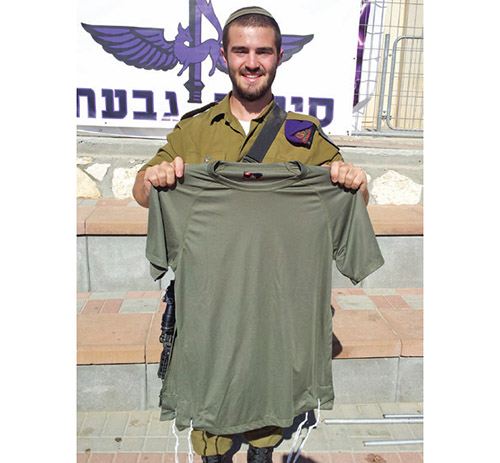


Many mitzvot in the Torah are manifested on both a spiritual and a physical level. Such is the case with the mitzvah of wearing tzitzit. The Torah tells men and boys to put fringes on the four corners of a garment to serve as a reminder of all the mitzvot, and by donning these tzitzit one is protected both spiritually and physically.
On Tuesday, January 1, Yeshivat Noam will host a community-wide event for men and boys in middle school and up to join together in making tzitzit for Tzahal. As the situation in Israel intensifies, more and more Israeli soldiers are being sent to the front lines. Rabbi Yitzchok Motechin, Yeshivat Noam middle school principal, recently became aware that many of these soldiers do not have tzitzit to wear to combat. This information inspired him to create a community event that will embrace the mitzvah of tzitzit while at the same time support IDF soldiers.
“At a minimum, if we have the chance to strengthen the resolve and morale of our chayalim before they go into battle or patrol, how can we not?” said Rabbi Motechin.
Rabbi Yedidya Atlas, a chaplain in the IDF, visited Yeshivat Noam and shared stories about IDF soldiers. Rabbi Atlas explained that most soldiers, observant and non-observant, want to wear tzitzit, which are believed to afford protection during combat. Many soldiers consider tzitzit a spiritual shield that they often refer to as “the real bulletproof vest,” or in Hebrew “hashachpatz ha’amiti.” Unfortunately, there is a real deficit in the supply of tzitzit. Because of budget constraints, the number of tzitzit provided to the IDF is limited to 10,000 pairs annually, but in reality they require closer to 40,000 pairs.
Rabbi Motechin recently asked Rabbi Atlas how he convinces non-observant soldiers to wear tzitzit. “I don’t have to ask them; they ask me,” Rabbi Atlas responded. The percentage of soldiers in combat who want to wear tzitzit is very high, he explained. A letter published during Operation Tzuk Eitan, the war in Gaza in the summer of 2014, described every soldier, religious or not, wearing olive green dri-fit tzitzit. According to the rabbi of Maglan (the special forces unit), by wearing tzitzit, soldiers are gaining both a mitzvah and a high-quality undershirt. Soldiers started calling them “shachpatzitzit,” a combination of the Hebrew term for body armor and tzitzit. Remarkably, many non-religious soldiers continued to wear tzitzit after the war was over.
Rabbi Motechin, along with the staff at Yeshivat Noam, believes this is an ideal opportunity to engage fathers, sons, and men throughout the community in a beautiful mitzvah, much in the way that the annual challah bake unites mothers, daughters and women to join together in celebration of an important mitzvah.
“It is a privilege to be able to participate in this initiative. Supporting chayalim who risk their lives to protect our homeland by enabling them to fulfill the mitzvah of tzitzit is a true honor,” expressed Rabbi Motechin.
The event will be held at Yeshivat Noam, 70 W. Century Road in Paramus, and will begin with davening at 9 a.m. followed by doughnuts and coffee and a tutorial video explaining how to create the tzitzit. Eighth grade boys will be trained in advance and will be available to help participants. In addition to middle school and high school boys, college students who are on break are welcome, as well as fathers and sons from the Jewish Women’s Renaissance Program (JWRP), an outreach organization for non-affiliated Jews in Bergen County.
The fee to attend the event is $10 per person in advance or $12 at the door, which will cover the cost of one donated pair of tzitzit to be sent to Israel. Sponsorship opportunities are available on multiple levels. For additional information or to pre-register, please contact Dalia Stelzer at [email protected].
By Andrea Nissel
�













